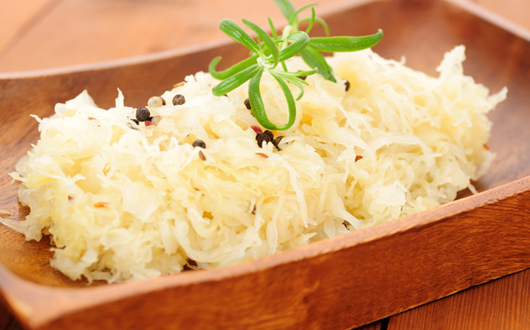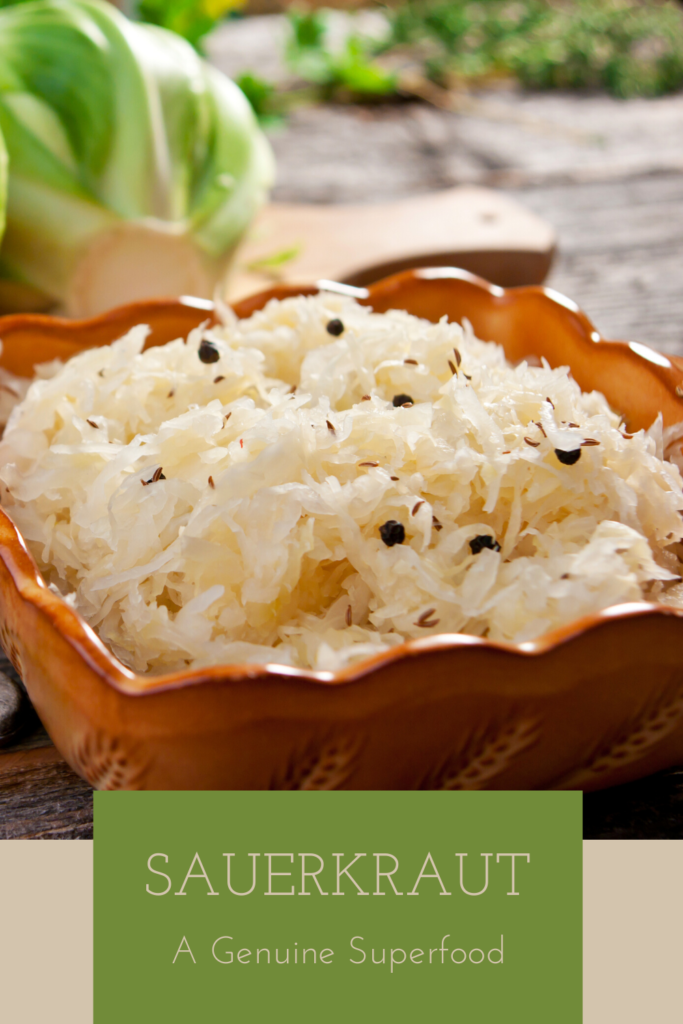
Sauerkraut is basically pickled cabbage. The German translation is literally “sour cabbage.” It is created when lactic acid bacteria ferments the sugars of shredded cabbage, which is where the delicious sour flavor comes from.
What you may not know is that sauerkraut is also a superfood, benefiting your body with GI, heart, energy, bone, immune, and anti-cancer benefits. Mix some sauerkraut with mashed potatoes or slap it on a Reuben sandwich to enjoy its pickled flavor and many health benefits. Let’s take a closer look at sauerkraut’s health benefits.
These days everyone is familiar with world cuisines like sauerkraut or kimchee, the popular Korean version of fermented cabbage. It has many spices and other ingredients added to the basic version of sauerkraut. It has a long shelf life if stored appropriately, by keeping it free of moisture.
It is cheap. It is not exotic, nor made from hard-to-find ingredients. It does not require refrigeration. If stored in the fridge, it loses the probiotics. It is important to buy the type of sauerkraut that is cultured but not pasteurized, which destroys most of its nutritional value.
You get the taste but not the health and goodness of fermentation. Adding the juice from sauerkraut to your diet works like an anti-fungal and antibacterial agent to cure infectious diseases.
The health benefits of sauerkraut are numerous, including improved digestive health, eye health, skin health, heart health, energy-boosting properties, immune system support, bone density building support, and even protection against certain cancers.
Sauerkraut actually has excellent anti-cancer properties. Sauerkraut was found to reduce cholesterol and triglyceride levels while at the same time augmenting heart-healthy antioxidants. Your heart is another benefactor of the wellness-boosting properties of sauerkraut. Sauerkraut reduces the level of cholesterol and triglycerides while making heart-healthy antioxidants.
What is Fermentation?
Sauerkraut is a way to ferment and pickle vegetables to preserve them during winter. It is prepared without cooking the cabbage. It is purely raw. The cabbage should be washed and dried with a towel before preparing it. Sauerkraut can be served by itself or as a side dish. In American cuisine, it is served with hot dogs.
Disease Prevention
It is said that prevention is better than the cure. Hence, eating sauerkraut helps prevent the damage before it is caused. Cultured veggies give longevity and constitute an important part of a super-healthy regimen to cleanse the intestinal system. Certain strains of Lactobacillus and other lactic acid bacteria that are present in raw and cultured veggies may also contain potential remedial properties, including anti-cancer and anti-inflammatory effects.
Vitamins and Minerals
Sauerkraut is low in calories and does not contain fat. Sauerkraut contains vitamins C, B, and K. It is high in calcium and magnesium, and it is a very good source of dietary fiber, potassium, copper, folate, and manganese. The fermentation of cabbage increases the nutrient levels of sauerkraut even more than the original cabbage.
Vitamin C Deficiency
Early sailors underwent a painful disease called scurvy, which is a disease caused by an extreme deficiency of vitamin C. Usually scurvy presents itself in a form of lethargy, blotchy skin, and bleeding gums. Sauerkraut helped eliminate those symptoms.
Eye Health
Sauerkraut is high in the antioxidants lutein and zeaxanthin, both connected with protecting eye health. Lutein also helps to improve visual performance and decrease light sensitivity. Lutein helps lower the risk of cataract development.
Anemia
Cabbage is chock full of iron and is a good source of vitamins C, B, and K. Iron helps increase energy production by tuning up your metabolism and increasing blood circulation. The combination of vitamin C and iron is needed for the proper absorption of iron that prevents anemia.
Immune and Pregnancy Health
Sauerkraut boosts the immune system by providing all the essential building blocks. It has been known to be eaten by pregnant women for ages for it’s vinegary taste and is also beneficial for pregnancy-related nausea or otherwise.
GI Support
Sauerkraut also contains live lactobacilli and beneficial microbes for digestive health and is rich in plant enzymes. The fiber and the probiotics aid digestion. Sauerkraut creates good intestinal flora that inhibits fungal and bacterial growth and balances the pH in the gut, which helps break down proteins. Sauerkraut contains lactic acid that works to create beneficial intestinal gut flora.
Contrary to popular belief, sauerkraut really does not contain vinegar. The sour taste comes from lactobacilli. It helps with weight loss and as a bowel regulator. It balances the acid/alkalinity in the body. It is known to fight free radicals due to it’s antioxidant properties.
Our GI function needs both saliva and digestive enzymes within the GI tract to break down food and absorb nutritients, but over time, eating foods that are low in these digestive enzymes will lower your own digestive enzyme reserve, thus causing acid reflux (a condition that causes esophageal distress).
Acne Treatment
Sauerkraut also helps eliminate acne because it cleanses the bowels, eliminating bad bacteria and also has skin cleansing properties when applied directly to the skin.
Anti-Cancer Properties
Sauerkraut converts fiber into a fatty acid known as butyrate. Butyrate is powerful against cancer. Sauerkraut also contains glucosinolates which help repair DNA damage and cell mutation in their promotion phase. The process of fermenting cabbage produces a substance called isothiocyanates, which has been proven helpful as a cancer growth deterrent.
How Sauerkraut Came to Be
Not only did the fermentation process of making sauerkraut help preserve vegetables during winter, people were able to get essential nutrients that were not available in meat-related products. Extreme cold climates did not allow people to grow vegetables due to frost. Cabbages do not like frost and they are suitable for warmer climates. Hence, people in Germany and Russia grew their cabbages in summer and brined them in salt with their own juice to preserve them for deep winter. Hence their Germanic name Sauerkraut.
You Can Ferment any Veggies
These days, any kind of vegetable can be preserved in this manner. Carrots, cucumbers, lemons, and raw mango can be fermented. Red cabbages are also used to make sauerkraut. It is called “ruby kraut”. Ruby kraut contains healthy amounts of lycophene which is considered good for colon and prostate health.
Raw food is needed in safe amounts to balance the inner ecology. Raw vegetables help build the immune system as well as detoxify the body by restoring cell level health. It packs a punch when it comes to nutrition for your heart, stomach, intestines, organs, and entire body.
Sauerkraut is for Everyone
Because of its nature of being a plant-based diet, sauerkraut is known and favored by anyone. Vegetarian, vegan and raw food enthusiasts can eat it too because it does not contain meat or meat-related products.
It is uncooked or pasteurized. It contains only cabbage, salt and water. Some people might think that it has lactic acid which comes from milk. This is not true. Lactic acid is a result of the process of fermentation. It can come from plant sources too, and naturally occurs in sauerkraut that is fermented in salt.
So vegans can enjoy the goodness of probiotics without ingesting yogurt which is made from animal milk.
It is easily available at many supermarkets and can be made at home with proper sanitation. What’s more, you can safely add sauerkraut to your pantry.
Sauerkraut should be an important part of your diet designed for anti-cancer properties, restoring gut flora, improving digestion, and preventing anemia.
Sauerkraut also contains a bunch of vitamins and minerals that you wouldn’t get through any other diets, fruits or vegetables. Most of all, this delightful dish is really a superfood!
Enjoyed Is Sauerkraut a Superfood? Studies Say Yes!? Share it with your friends so they too can follow the Superfoodsliving journey.
Share on Pinterest
